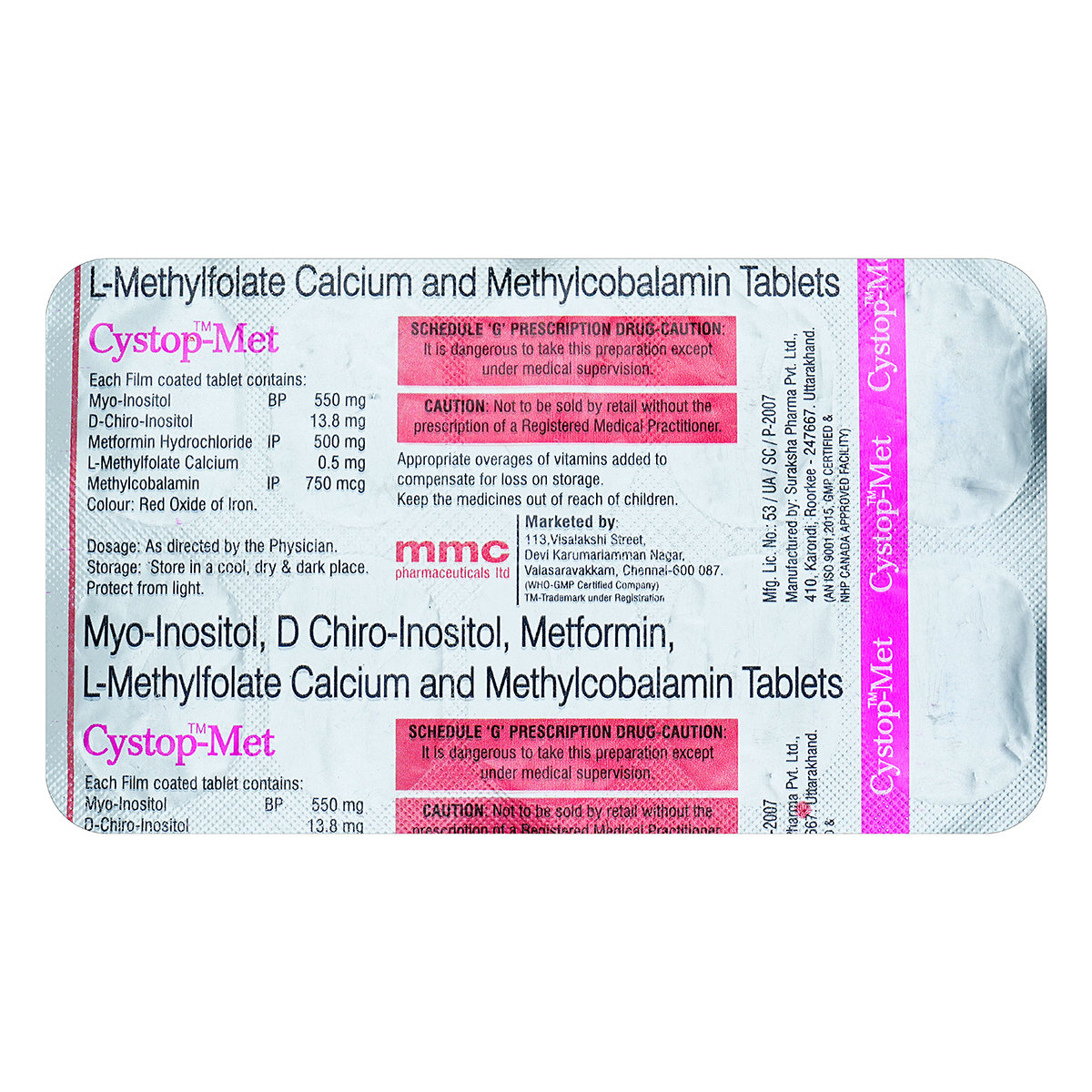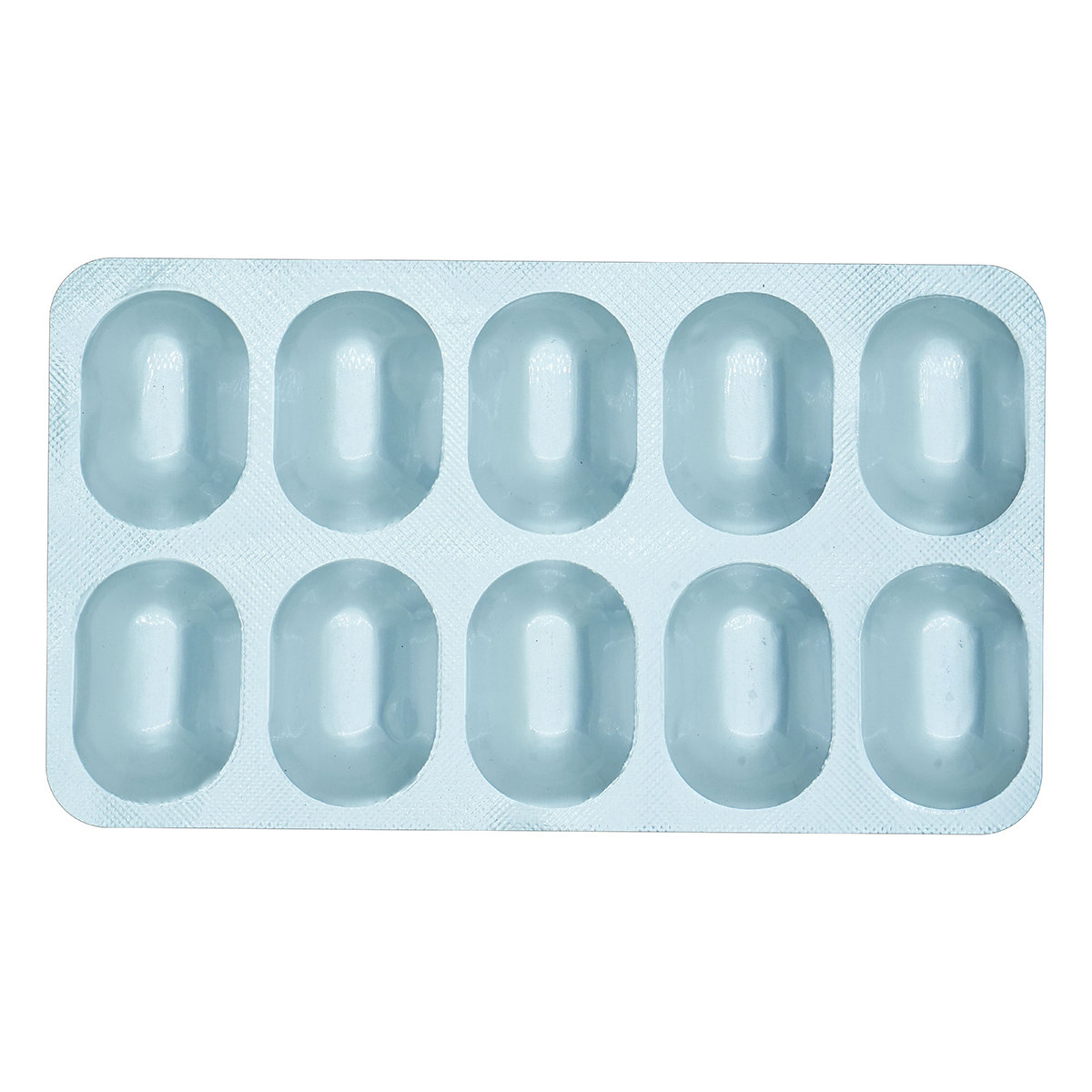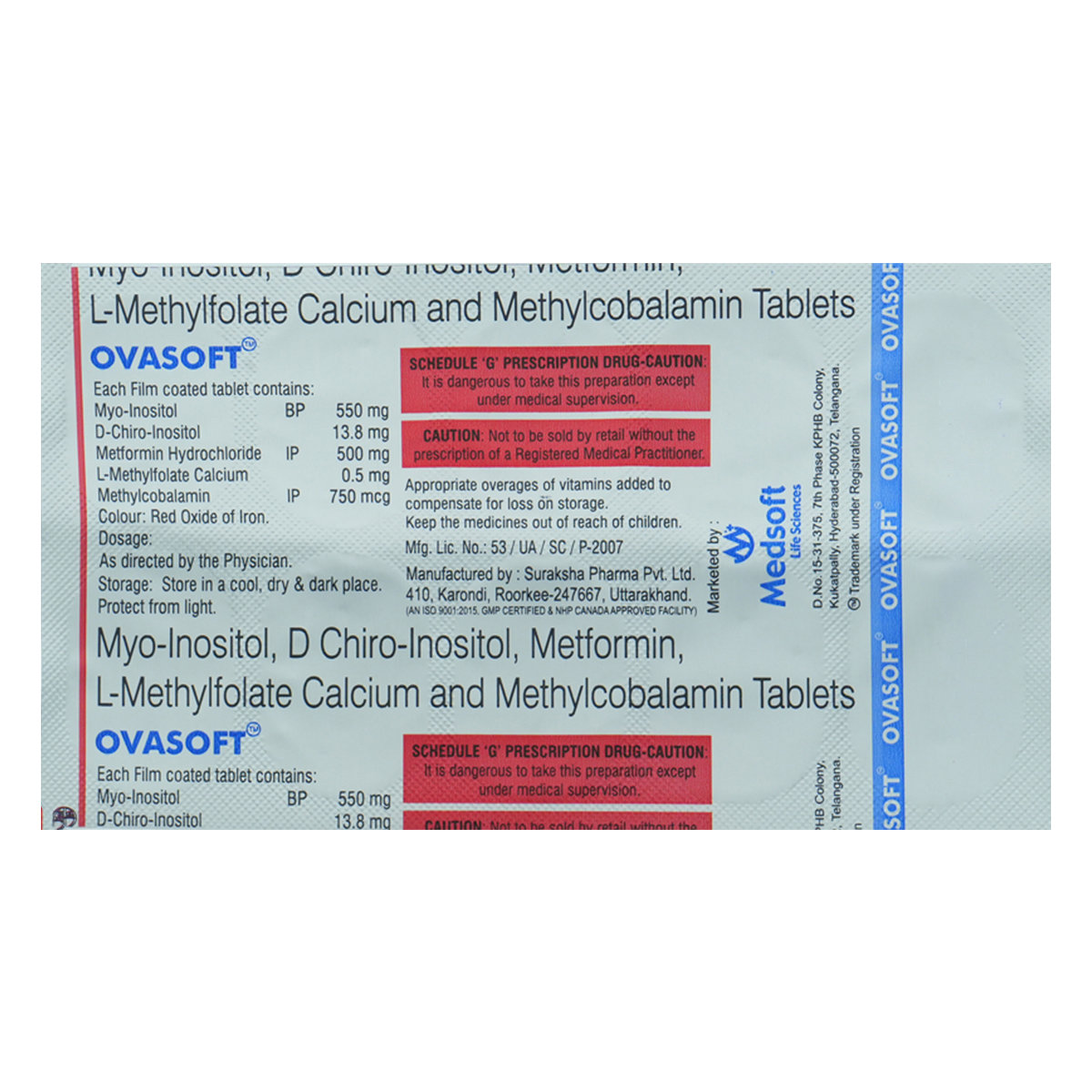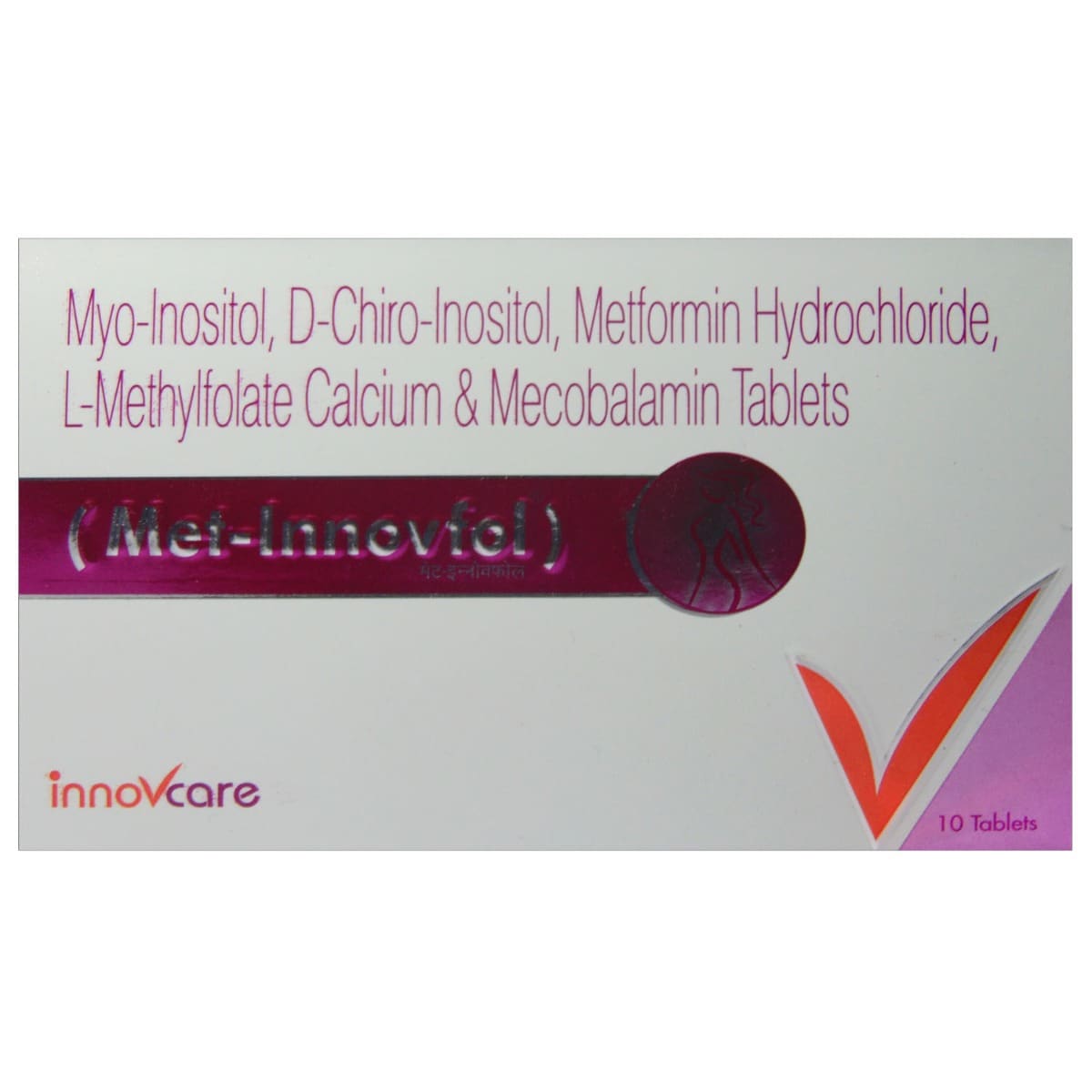Cystop-Met Tablet 10's
MRP ₹281
(Inclusive of all Taxes)
₹42.1 Cashback (15%)
Provide Delivery Location
Online payment accepted
 Prescription drug
Prescription drugWhats That
Manufacturer/Marketer :
Consume Type :
Expires on or after :
Return Policy :
About Cystop-Met Tablet
Cystop-Met Tablet is a combination medicine indicated for the treatment of polycystic ovarian syndrome (PCOS). It also helps to correct the hormonal imbalance and menstrual cycle to achieve ovulation. The polycystic ovarian syndrome is a hormonal disorder common in women of reproductive age.
Cystop-Met Tablet contains D-chiro inositol, Myo-inositol, Metformin, L-methylfolate calcium, and Methylcobalamin. Cystop-Met Tablet enhances the body’s response to insulin and lowers high homocysteine levels. It also helps improve hormonal balance, follicular development, improves egg quality, regulates menstruation, and restores ovulation in women.
In some cases, you may experience common side effects, such as nausea, vomiting, diarrhoea, stomach pain, and loss of appetite. Most of these side effects do not require medical attention and will resolve gradually over time. However, you are advised to talk to your doctor if you experience these side effects persistently.
Let your doctor know if you are taking prescription/non-prescription drugs or herbal products before starting Cystop-Met Tablet . If you are known to be allergic to any of the components in Cystop-Met Tablet , please inform your doctor. Consult your doctor before taking Cystop-Met Tablet if you are pregnant or breastfeeding.
Uses of Cystop-Met Tablet
Directions for Use
Key Benefits
Cystop-Met Tablet is a combination of five drugs, namely: D-chiro inositol, Myo-inositol, Metformin, L-methylfolate calcium, and Methylcobalamin. Cystop-Met Tablet is used to treat polycystic ovarian syndrome (PCOS). It also helps to correct the hormonal imbalance and menstrual cycle to achieve ovulation. Cystop-Met Tablet enhances the body’s response to insulin and lowers high levels of homocysteine. It also helps improve hormonal balance, follicular development, improves egg quality, regulates menstruation, and restores ovulation in women. Thereby, Cystop-Met Tablet helps in treating PCOS.
Storage
- Inform Your Doctor: Notify your doctor immediately about your diarrhoea symptoms. This allows them to adjust your medication or provide guidance on managing side effects.
- Stay Hydrated: Drink plenty of fluids to replace lost water and electrolytes. Choose water, clear broth, and electrolyte-rich drinks. Avoid carbonated or caffeinated beverages to effectively rehydrate your body.
- Follow a Bland Diet: Eat easy-to-digest foods to help firm up your stool and settle your stomach. Try incorporating bananas, rice, applesauce, toast, plain crackers, and boiled vegetables into your diet.
- Avoid Trigger Foods: Steer clear of foods that can worsen diarrhoea, such as spicy, fatty, or greasy foods, high-fibre foods, and dairy products (especially if you're lactose intolerant).
- Practice Good Hygiene: Maintain good hygiene to prevent the spread of infection. To stay healthy, wash your hands frequently, clean and disinfect surfaces regularly, and avoid exchanging personal belongings with others.
- Take Anti-Diarrheal Medications: If your doctor advises, anti-diarrheal medications such as loperamide might help manage diarrhoea symptoms. Always follow your doctor's directions.
- Keep track of your diarrhoea symptoms. If they don't get better or worse or are accompanied by severe stomach pain, blood, or dehydration signs (like extreme thirst or dark urine), seek medical help.
- Inform your doctor about the nausea and discuss possible alternatives to the medication or adjustments to the dosage.
- Divide your daily food intake into smaller, more frequent meals to reduce nausea.
- Opt for bland, easily digestible foods like crackers, toast, plain rice, bananas, and applesauce.
- Avoid certain foods that can trigger nausea, such as fatty, greasy, spicy, and smelly foods.
- Drink plenty of fluids, such as water, clear broth, or electrolyte-rich beverages like coconut water or sports drinks.
- Use ginger (tea, ale, or candies) to help relieve nausea.
- Get adequate rest and also avoid strenuous activities that can worsen nausea.
- Talk to your doctor about taking anti-nausea medication if your nausea is severe.
- Record when your nausea occurs, what triggers it, and what provides relief to help you identify patterns and manage your symptoms more effectively.
- Preventing Vomiting (Before it Happens)
- Take medication exactly as prescribed by your doctor. This can help minimize side effects, including vomiting.
- Having a small meal before taking your medication can help reduce nausea and vomiting.
- Talk to your doctor about taking anti-nausea medication along with your prescribed medication.
- Managing Vomiting (If it Happens)
- Try taking ginger in the form of tea, ale, or candy to help alleviate nausea and vomiting.
- What to Do if Vomiting Persists
- Consult your doctor if vomiting continues or worsens, consult the doctor for guidance on adjusting your medication or additional treatment.
- Tell your doctor about your GAS symptoms. They may change your medication regimen or prescribe additional drugs to help you manage them.
- To manage GAS symptoms, eat a balanced diet of fibre, vegetables, and fruits.
- Drink enough water throughout the day to avoid constipation and treat GAS symptoms.
- Regular exercise like yoga and walking may help stimulate digestion and alleviate GAS symptoms.
- Take probiotics only if your doctor advises, as they may help alleviate GAS symptoms by promoting gut health.
- Take medication for GAS symptoms only if your doctor advises, as certain medications can interact with your existing prescriptions or worsen symptoms.
- If symptoms persist, worsen, or are accompanied by severe abdominal pain, vomiting, or bleeding, seek immediate medical attention.
- If you experience low blood sugar levels, inform your doctor. They will assess the severity and make recommendations for the next actions.
- Your doctor will assess your symptoms, blood sugar levels, and overall health before recommending the best course of action, which may include treatment, lifestyle modifications, or prescription adjustments.
- Follow your doctor's instructions carefully to manage the episode and adjust your treatment plan.
- Make medication adjustments as recommended by your doctor to prevent future episodes.
- Implement diet and lifestyle modifications as your doctor advises to manage low blood sugar levels.
- Monitor your blood sugar levels closely for patterns and changes.
- Track your progress by recording your blood sugar levels, food intake, and physical activity.
- Seek further guidance from your doctor if symptoms persist or worsen so that your treatment plan can be revised.
- Take medications with food (if recommended): It can help prevent stomach distress and indigestion.
- Eat smaller, more frequent meals: Divide daily food intake into smaller, more frequent meals to ease digestion.
- Avoid trigger foods: Identify and avoid foods that trigger indigestion, such as spicy, fatty, or acidic foods.
- Stay upright after eating: Sit or stand upright for at least 1-2 hours after eating to prevent stomach acid from flowing into the oesophagus.
- Avoid carbonated drinks: Avoid drinking carbonated beverages, such as soda or beer, which can worsen indigestion.
- Manage stress: To alleviate indigestion, engage in stress-reducing activities like deep breathing exercises or meditation.
- Consult a doctor if needed: If indigestion worsens or persists, consult a healthcare professional to adjust the medication regimen or explore alternative treatments.
- Drink water or other clear fluids.
- To prevent worsening of pain, limit intake of tea, coffee, or alcohol.
- Include bland foods like rice, toast, crackers, and rice in your diet.
- Avoid lying down immediately after eating as it may cause indigestion or heartburn.
- Avoid acidic and spicy food as it may cause indigestion.
Drug Warnings
Do not take Cystop-Met Tablet if you are allergic to any of its components. Inform your doctor if you have bipolar disorder, diabetes, heart, kidney or liver problems. Consult your doctor if you are pregnant or breastfeeding. Let your doctor know if you are taking prescription/non-prescription drugs or herbal products before starting Cystop-Met Tablet .
Drug-Drug Interactions
Drug-Drug Interactions
Login/Sign Up
Co-administration of Cystop-Met Tablet with Metrizamide together can cause the risk of lactic acidosis (when the body produces too much lactic acid ).
How to manage the interaction:
Taking Cystop-Met Tablet with Metrizamide is generally avoided as it can possibly result in an interaction, it can be taken if a doctor has advised it. However, if you experience headaches, muscle cramps or pain, contact a doctor immediately. Do not discontinue any medications without consulting a doctor.
Co-administration of Iofendylate with Cystop-Met Tablet can increase the risk of side effects.
How to manage the interaction:
Taking Cystop-Met Tablet with Iofendylate is generally avoided as it can result in an interaction, please consult your doctor before taking it.
Co-administration of Iohexol with Cystop-Met Tablet can increase the risk of side effects.
How to manage the interaction:
Taking Cystop-Met Tablet with Iohexol is generally avoided as it can result in an interaction, please consult your doctor before taking it.
Co-administration of Iopromide with Cystop-Met Tablet can increase the risk of lactic acidosis.
How to manage the interaction:
Taking Iopromide with Cystop-Met Tablet is not recommended, please consult a doctor before taking it. Do not discontinue the medication without consulting a doctor.
Co-administration of Iomeprol with Cystop-Met Tablet can increase the risk of side effects.
How to manage the interaction:
Taking Cystop-Met Tablet with Iomeprol is not recommended, please consult a doctor before taking it. Do not discontinue the medications without consulting a doctor.
Co-administration of Iopamidol with Cystop-Met Tablet can increase the risk of side effects.
How to manage the interaction:
Taking Cystop-Met Tablet with Iopamidol is not recommended, please consult a doctor before taking it. Do not discontinue the medications without consulting a doctor.
Co-administration of Ioglicic acid with Cystop-Met Tablet can increase the risk of side effects.
How to manage the interaction:
Taking Cystop-Met Tablet with Ioglicic acid is generally avoided as it can result in an interaction, please consult your doctor before taking it.
Co-administration of Iodixanol with Cystop-Met Tablet can increase the risk of side effects.
How to manage the interaction:
Taking Cystop-Met Tablet with Iodixanol is not recommended, please consult a doctor before taking it. Do not discontinue the medications without consulting a doctor.
Co-administration of Ioglycamic acid with Cystop-Met Tablet can increase the risk of side effects.
How to manage the interaction:
Taking Cystop-Met Tablet with Ioglycamic acid is generally avoided as it can result in an interaction, please consult your doctor before taking it.
Co-administration of Cystop-Met Tablet and Iobitridol can increase the risk of lactic acidosis (when the body produces too much lactic acid).
How to manage the interaction:
Taking Cystop-Met Tablet with Iobitridol is generally avoided as it can result in an interaction. Please consult your doctor before taking it.
Drug-Food Interactions
Drug-Food Interactions
Login/Sign Up
Diet & Lifestyle Advise
- Follow a well-balanced diet.
- Exercising regularly helps in improving overall health.
- Rest well, get plenty of sleep.
- Avoid smoking and alcohol consumption.
- Meditation and yoga can help lower stress.
- Avoid processed and fried food.
- Include high fibre foods, fatty fish, broccoli, dark red fruits, and leafy vegetables.
Side Effects of Cystop-Met Tablet
- Nausea
- Vomiting
- Stomach pain
- Loss of appetite
- Changes in taste
- Diarrhoea
Habit Forming
Therapeutic Class
All Substitutes & Brand Comparisons
RX
Out of StockOvasoft Tablet 10's
Medsoft Life Sciences
₹240
(₹21.6 per unit)
14% CHEAPERRX
Out of StockInsuphage-PCO Tablet 10's
India Biotics Drugs & Chemicals
₹260
(₹23.4 per unit)
7% CHEAPERRX
Fertioz-M Tablet 10's
Saiwon Healthcare (India) Pvt Ltd
₹280
(₹25.2 per unit)
Author Details
We provide you with authentic, trustworthy and relevant information
Drug-Diseases Interactions
Drug-Diseases Interactions
Login/Sign Up
FAQs
Cystop-Met Tablet enhances the body’s response to insulin and lowers high levels of homocysteine. It also helps improve hormonal balance, follicular development, improves egg quality, regulates menstruation, and restores ovulation in women. Thereby, Cystop-Met Tablet helps in treating PCOS.
To treat your condition effectually, continue taking Cystop-Met Tablet for as long as your doctor has prescribed it for you. Do not be reluctant to speak with your doctor if you experience any difficulty while taking Cystop-Met Tablet .
Consult your doctor if you are diabetic as Cystop-Met Tablet contains metformin. Taking Cystop-Met Tablet along with anti-diabetic medicines might lower the blood glucose levels than normal. Regular monitoring of blood sugar levels whilst taking Cystop-Met Tablet is advised.
Diarrhoea could be a side-effect of Cystop-Met Tablet . Eat non-spicy meals and drink plenty of fluids if you experience diarrhoea. Consult a doctor if you have severe diarrhoea.
If you miss a dose, try to take it as soon as you remember. However, if it is time for the scheduled dose, skip the missed dose and take the scheduled dose instead. Avoid taking double doses as it might cause overdose or unpleasant side effects.
Disease/Condition Glossary
Polycystic ovarian syndrome (PCOS): Polycystic ovarian syndrome is a hormonal disorder common in women of reproductive age. Women with PCOS have irregular periods and higher than normal male hormones. It causes enlarged ovaries with small cysts on the outer edges. PCOS might cause diabetes and heart problems. Symptoms of PCOS include irregular periods, excess hair growth, obesity, male pattern baldness, headache, darkening of the skin, and acne.

Have a query?
Alcohol
Safe if prescribed
Avoid or limit alcohol consumption while taking Cystop-Met Tablet .
Pregnancy
Consult your doctor
Please consult your doctor if you are pregnant or if you have any concerns regarding this; your doctor will prescribe only if the benefits outweigh the risks.
Breast Feeding
Consult your doctor
Consult your doctor if you are breastfeeding; your doctor will decide whether Cystop-Met Tablet can be taken by breastfeeding mothers or not.
Driving
Safe if prescribed
It is not known if Cystop-Met Tablet alters your ability to drive. Drive or operate machinery only if you are alert.
Liver
Consult your doctor
Limited data is available regarding the usage of Cystop-Met Tablet in patients with liver impairment. Please consult your doctor.
Kidney
Consult your doctor
Limited data is available regarding the usage of Cystop-Met Tablet in patients with kidney impairment. Please consult your doctor.
Children
Safe if prescribed
Limited information is available regarding the usage of Cystop-Met Tablet in children. Please consult your doctor if you have any concerns.










_0.jpg?tr=q-85)

